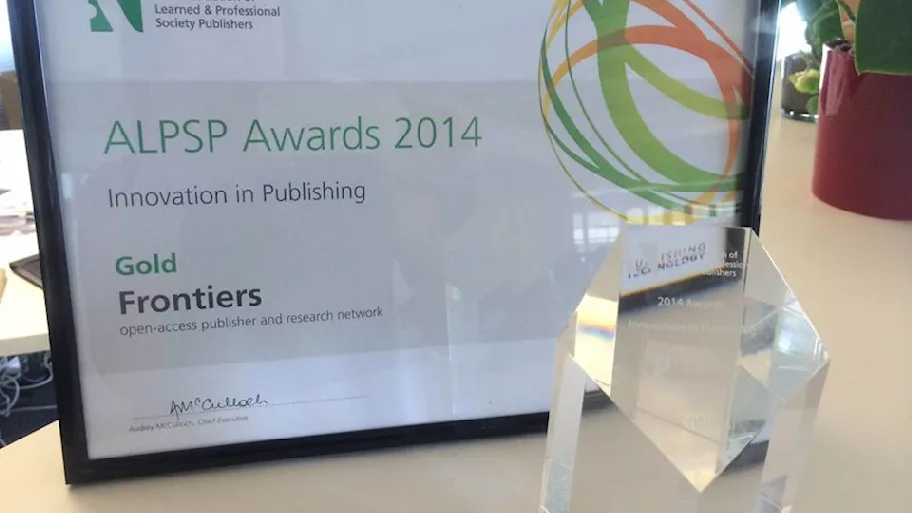
- Science news
- Open science and peer review
- Why you should review papers for Frontiers in Educational Psychology
Why you should review papers for Frontiers in Educational Psychology
By encouraging the generation of a co-authored commentary both the reviewer and the author can work together in a collegial and constructive environment to expand personal networks and in turn support the continued development of science.
The Frontier’s portfolio continues to expand and as it does our innovative review strategy is being recognised more and more as being at the very edge of cutting-edge innovation. Recently such innovation was recognised with the prestigious Gold Award from the Association of Learned and Professional Society Publishers (ALPSP). Such a recognition acknowledges the most innovative strategies that support the open-access publication process and those individuals who drive it forward. Indeed, in receiving the award Professor Kamila Markram dedicated it to the community of open-access researchers who support the Frontier’s process and noted that ‘…their continued dedication and faith in the Frontier’s open-science platform that is helping to transform scholarly publishing and the dissemination of articles in the Internet era’ (Markram, 2014). Yet even with the acknowledgement of the ALPSP Gold Award we should not stand idle but continue to expand the boundaries of innovation. This is especially relevant for the more ‘junior’ journals in the Frontier’s canon such as Frontiers in Educational Psychology. As an active member of the Frontier’s community and a firm supporter of the Frontier’s open-science philosophy I have one concern that I raise here that may seriously impact the further growth of the journal but one suggestion is also made that, if implemented, may address this potential issue.
Currently the main activity of the Associate Editorial Board (AE) is structured around the timely identification and recruitment of suitably qualified members of Editorial Review Board (ER) who can provide a report on any submission prior to publication. As in the traditional form of reviewing, members of the ER are invited to read the submitted article but then engage with the authors directly via the interactive review forum. Should this process go well the reviewers will endorse the article and effectively ‘clear’ the paper for the AE to make a subsequent publication decision. While editorial input at this stage is an additional quality control mechanism it is largely moot as any articles that reach this stage of the process would have gone through several iterations in the interactive review forum and as such are unlikely to be rejected at this stage. The length of time that any given paper spends in the interactive review stage can vary from a few days to several months and articles are likely to have undergone a number of iterations. This process is excellent and serves to ensure that feedback on pre-submitted articles are provided by experts in the field in a transparent fashion and not from a single editor who acts in a ‘gatekeeper’ capacity. My concern is with the initial process of identifying suitable reviewers who can be invited to consider the articles in the first place.
The process of identifying reviewers can sometimes involve the AE being left to traverse through the entire ER board as well as personal networks to identify an appropriate person who can consider the article. Should such a person not be readily identifiable then after a period the Frontier’s automated journal management system will start to deploy invitations to an ever-increasing group of potential people who may be appropriately qualified to provide constructive feedback. The system continues in this manner until you (or it) manages to contact an individual who is willing to review the article. This is not a trivial task and it is often the case that in quite a short period of time a significant number of people have been invited to consider acting as a reviewer. Indeed, I was recently invited to edit a paper for the journal but it was only after 43 such invitations before appropriate reviewers could be secured. Such a large number of invitations is significant for a journal such as Frontiers in Educational Psychology where, due to his relative youth compared to other journals in the Frontier’s portfolio appropriately qualified individuals may not be so readily identifiable.
However, any delay incurred in managing to secure reviewers can have a negative effect on the growth and development of a journal and have a knock-on effect on the various quality metrics for a given journal. When the growth of the journal is largely dependent on the rate at which published articles are cited any delay may in fact be a significant rate-limiting step in its subsequent development. To mitigate such delays there are a number of incentives currently in place that encourages members of the ER to review articles such as being acknowledged as the reviewer on the paper itself as well as being invited to generate a post publication commentary on that particular article.
However, in light of the fact that the interactive review process is still effectively a combatorial process such incentives may not be sufficient. This is perhaps quite unfortunate as the interactive review forum is designed to facilitate constructive collaboration between reviewers and authors. Such a situation is especially significant when one considers the anecdotal observation that the field of Educational Psychology tends to be an inherently social activity – rather than one requiring many hours at a laboratory benchside. It may therefore be possible to utilise such a perspective to encourage a wider pool of suitable and enthusiastic reviewers. Here there is immense utility to be had by inviting both the reviewers as well as the original authors to subsequently publish a small commentary together. This is not the same as the current practice which sees reviewers being invited to submit a commentary on the article that they just considered but, as it is co-authored, it perhaps allows the social nature of our community to be facilitated. Such an article would also ensure that any novel ideas that may have arisen during interactive review process are consolidated further by both parties. But perhaps by encouraging the generation of a co-authored commentary both the reviewer and the author can work together in a collegial and constructive environment to expand personal networks and in turn support the continued development of science.
Markram, K. (2014). Frontiers receives Gold Prize for the ALPSP Award for Innovation in Publishing. Available: http://www.frontiersin.org/news/Frontiers_receives_Gold_Prize_for_the_ALPSP_Award_for_Innovation_in_Publishing_2014_3/915






